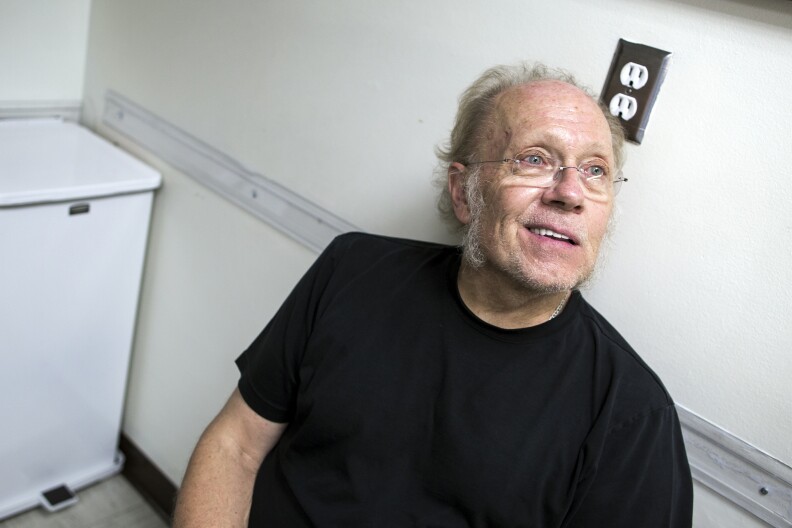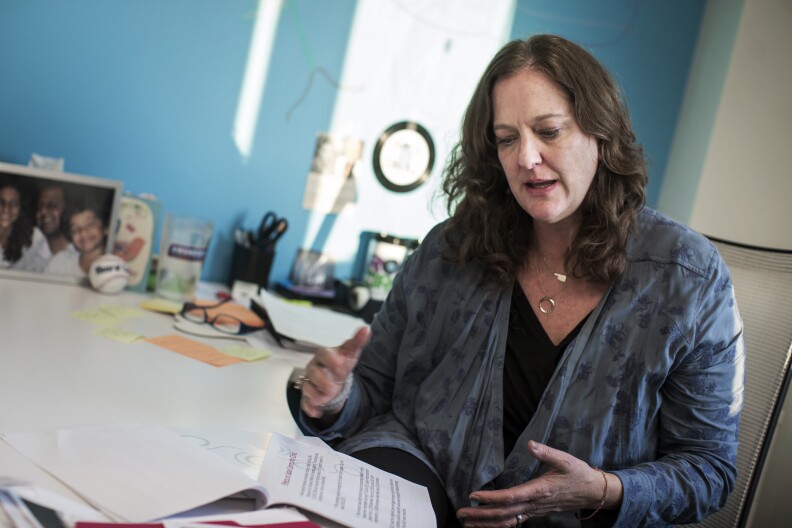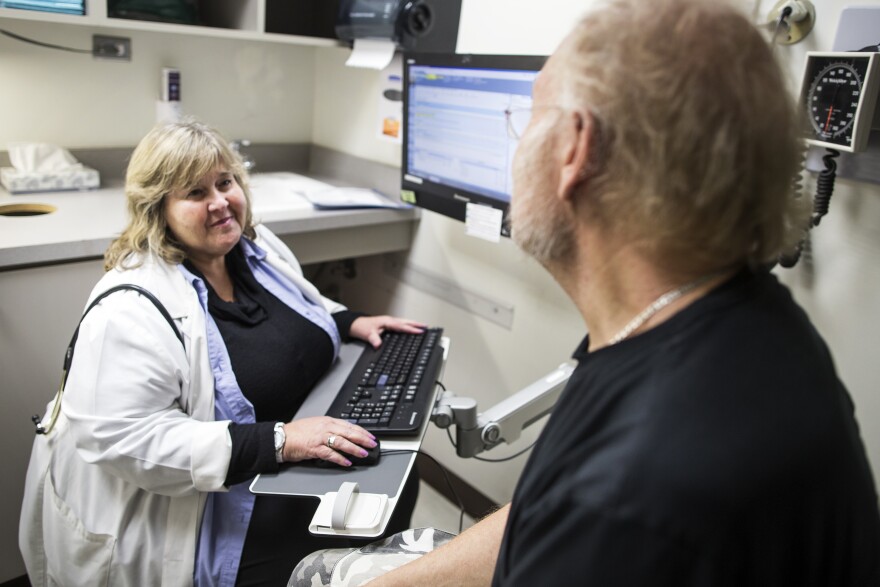Congress has cut federal funding for public media — a $3.4 million loss for LAist. We count on readers like you to protect our nonprofit newsroom. Become a monthly member and sustain local journalism.
Awaiting Trump, community clinics plan for an uncertain future
Chance Rearden used to get health insurance through his job in the entertainment industry. But when his hours fell off, he didn't qualify for coverage anymore.
At the time, Rearden wasn't old enough to get Medicare and he couldn't afford to pay out of pocket for treatment. So, he says, he often skipped going to the doctor.
Then the Affordable Care Act took effect, and under its expansion of Medicaid eligibility, Rearden was able to sign up for California's version of the program, Medi-Cal.
"I've been able to get medical attention that I otherwise wouldn't be able to afford to get," he says.
Rearden, now 66, gets treated at the Saban Community Clinic near Los Angeles' Fairfax District, where he receives primary care and has seen specialists, including a dermatologist and a podiatrist.
But with the incoming Trump administration looking to repeal the Affordable Care Act, he's scared his benefits will dry up. One key piece of the Republican plan is turning Medicaid into a block grant program, which could mean less money for California to run Medi-Cal.
A lot of people who have benefited from the Medi-Cal expansion are worried about losing their coverage, and the community clinics that serve many of them are concerned that they'll have to cut back on some of their services.
"Most vulnerable and poorest patients"
Saban Community Clinic nurse practitioner Stacy Nadler says her Medi-Cal patients are asking her all sorts of questions, like, "Will their specialists still be covered? Do you think they'll still be able to see the chiropractor or the neurosurgeon? Or they're planning a surgery for next year. What do I think is going to happen?"
Nadler doesn't have the answers. Neither does clinic CEO Julie Hudman. But she knows there's a lot at stake for her patients.
"A lot of the folks that we see are single adults," Hudman says. "They're maybe more transitional. They're homeless patients. They have behavioral health challenges. They're really, to be honest, some of the most vulnerable and poorest patients of all."

Before the Affordable Care Act, eligibility for Medicaid depended on a variety of factors, including income, household size, family status, disability and more. Under Obamacare, people can qualify on income alone if their household makes less than 138 percent of the federal poverty level - $16,395 for an individual and $33,534 for a family of four, according to the California Department of Health Care Services.
About half of the clinic's 18,000 patients were uninsured prior to the Affordable Care Act, says Hudman. They paid very little for treatment – maybe a co-pay of $5 or $10. Almost all of those patients qualified for Medi-Cal after the health law expanded eligibility, she says.
That's made a big difference for the bottom line, Hudman says, explaining that Medi-Cal pays the clinic around $200 per patient visit.
These days, more than half of Saban's revenue comes from health insurance programs. The possibility of losing some of that money is forcing Hudman to make some hard decisions.
She says she was looking to lease or buy a fourth facility, but with Trump's election that plan is on hold.
"We had a lot of momentum moving forward and now we've just sort of … stalled," she says.
Hudman has also decided to freeze her plans to expand free services, like help for the homeless.
"I'm not willing to move forward and take some of those risks that I think are what our community and our patients need," she says. "I need to make sure that we're able to pay our bills and pay our staff."

A lot of health centers are in a similar situation, according to Louise McCarthy, president and CEO of the Community Clinic Association of Los Angeles County. She says it's frustrating not knowing exactly what Trump and the Republican-led Congress will do.
In the end, though, "the populations [the clinics] serve are there and are going to stay there," she says. "So the question is, how do you broker the resources to do it?"
Paul Ryan's "A Better Way" proposal
The most detailed Republican plan for repealing and replacing the Affordable Care Act is House Speaker Paul Ryan's (R-Wisconsin) "A Better Way" proposal.
It argues that Medicaid's structure is financially unsustainable over the long term and is unfair to states, whose governors and legislatures "know better than Washington bureaucrats where there are unmet needs and opportunities to cut down on waste, fraud, and abuse."
The Affordable Care Act's Medicaid expansion unfairly dedicates a greater share of federal dollars to people who make more than the poorest program participants, according to Ryan's plan.
The proposal suggests Medicaid be transformed to either provide states with a fixed block grant or a set allotment for each patient, along with the authority to adjust eligibility and benefits "in a way that better meets the needs of their state populations, promotes personal responsibility and healthy behaviors, and encourages a more holistic approach to care."
The blueprint proposes that states could base eligibility on requiring "able-bodied individuals to seek a job, be employed, or participate in a training or educational program," as some states have done under a 2012 Supreme Court ruling that gave them the choice of opting out of the Medicaid expansion.
The ultimate goal, according to Ryan's plan, is to help Medicaid recipients get off of the program and onto private health coverage.
"As state reforms reduce dependence on government assistance, the people helped would enter the workforce, have insurance, and be able to lift themselves up the economic ladder," it says.
Meanwhile, community clinics are seeking to reassure Medi-Cal patients nervous about the future. Saban nurse practitioner Nadler says she recently saw a man who wanted to get his high blood pressure under control. He got Medi-Cal through the Obamacare expansion and she says he's worried that if the law is repealed, he might not get his medications anymore.
She recalls telling him, "we're not going to treat you any differently than we did before. We need to stabilize your blood pressure no matter what, whether you have health insurance or not. Even if you don't have health insurance, I'm sure we're going to still take care of you."
As Editor-in-Chief of our newsroom, I’m extremely proud of the work our top-notch journalists are doing here at LAist. We’re doing more hard-hitting watchdog journalism than ever before — powerful reporting on the economy, elections, climate and the homelessness crisis that is making a difference in your lives. At the same time, it’s never been more difficult to maintain a paywall-free, independent news source that informs, inspires, and engages everyone.
Simply put, we cannot do this essential work without your help. Federal funding for public media has been clawed back by Congress and that means LAist has lost $3.4 million in federal funding over the next two years. So we’re asking for your help. LAist has been there for you and we’re asking you to be here for us.
We rely on donations from readers like you to stay independent, which keeps our nonprofit newsroom strong and accountable to you.
No matter where you stand on the political spectrum, press freedom is at the core of keeping our nation free and fair. And as the landscape of free press changes, LAist will remain a voice you know and trust, but the amount of reader support we receive will help determine how strong of a newsroom we are going forward to cover the important news from our community.
Please take action today to support your trusted source for local news with a donation that makes sense for your budget.
Thank you for your generous support and believing in independent news.

-
The new ordinance applies to certain grocers operating in the city and has led to some self-checkout lanes to shutter.
-
Children asked to waive right to see a judge in exchange for $2,500
-
There’s still a lot to be determined as the refinery, which supplies about one-fifth of Southern California's vehicle fuels, works to restore production and as data is collected.
-
The FCC voted to end E-Rate discounts for library hotspot lending and school bus Wi-Fi.
-
About half the Pacific Airshow’s 2025 lineup has been grounded because of the federal government shutdown.
-
USC says it’s reviewing the letter also sent to eight other prestigious schools nationwide. California's governor vowed that any California universities that sign will lose state funding.











